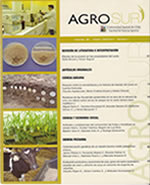Assessing the agroecological status of a farm: a principle-based assessment tool for farmers
Main Article Content
Abstract
Climate change and inappropriate landscape management have increased the intensity and severity of wildfires in Chilean Mediterranean ecosystems, including sclerophyllous forests. During the 2016-2017 summer, a megafire affected more than 5,000 km2 in the country, compromising these ecosystems. Despite advances on aboveground recovery following fires, belowground restoration has been less explored in these forests. This study aimed to evaluate early responses of simple and approachable soil health indicators to different organic amendments and vegetation establishment methods. Six months following organic amendment application (compost, swine or poultry manure) and plant establishment (either seeds or seedlings), soil health indicators including heterotrophic microbial counts (colony-forming-units -CFUs) and physicochemical characteristics were determined in a fire-affected sclerophyllous Mediterranean forest of central Chile. The organic amendments, plant establishment, and their interaction, significantly affected soil CFUs, while chemical parameters including pH and electrical conductivity were solely affected by organic amendment. The swine manure-plantation treatment and the unburned reference forest had four- and five-fold more CFUs than the control, respectively. No effect was observed in soil gravimetric water content, organic matter content, or aggregate distribution. Overall, less marked effects were registered in soil physicochemical conditions as compared to microbial counts.

